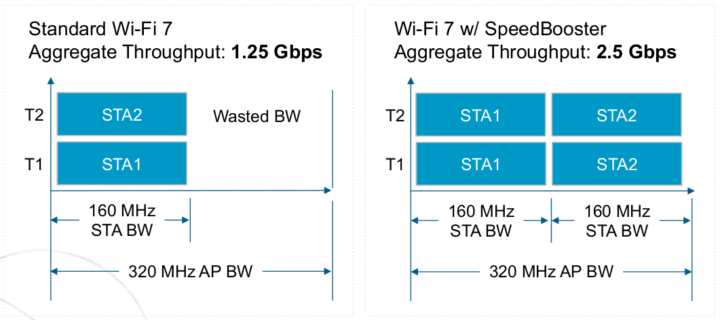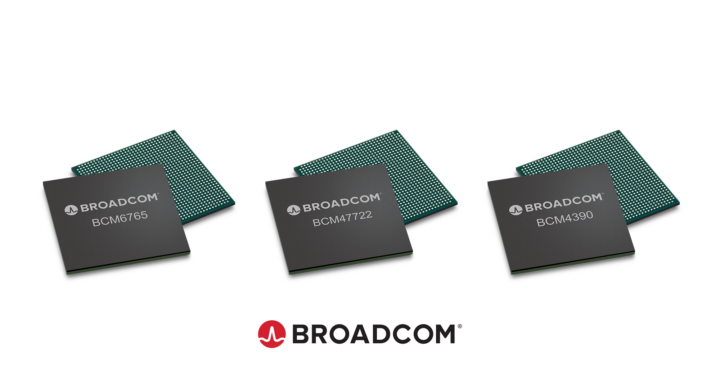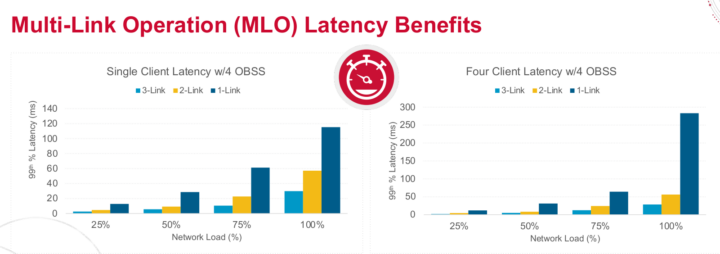Broadcom has announced its second generation WiFi 7 chipsets: the BCM6765 residential WiFi 7 access point chip, the BCM47722 enterprise WiFi 7 access point chip with dual IoT radios that support simultaneous operation for Bluetooth Low Energy (BLE), Zigbee, Thread, and Matter protocols, and the BCM4390 low-power Wi-Fi 7, Bluetooth, and 802.15.4 combo chip designed for use in mobile devices.
This follows the introduction of Broadcom’s first WiFi 7 chipsets in April 2022 with residential and enterprise WiFi 7 access point chips, and a WiFi 7 client chip, but the second generation access point chipsets support 320 MHz 2-stream Wi-Fi operation and add extra features, and the BCM4390 optimized costs bringing WiFi 7 to lower-prices phones and devices.
BCM6765 residential Wi-Fi access point chip highlights:
- CPU – Quad-core ARMv8 CPU with 10Gbps Ethernet PHY
- WiFi 7
- Dual 2×2 tri-band (2.4, 5, and 6 GHz) capable radios that support simultaneous operation in any band
- Integrated 2.4 GHz power amplifiers and support for Digital Pre-distortion (DPD) external FEMs for reduced power consumption
- 4096-QAM modulation and 320 MHz channel bandwidth for 8.64 Gbps PHY rate
- Multi-link operation (MLO) with up to 3-link support on SoC and SpeedBooster support
- Compliance with Wi-Fi 7 (IEEE 802.11be) and Automated Frequency Coordination (AFC) specifications
BCM47722 enterprise WiFi access point SoC specifications and key features
- CPU – Quad-core ARMv8 CPU with 10Gbps Ethernet PHY
- Wireless
- WiFi 7
- Dual 2×2 tri-band (2.4, 5, and 6 GHz) capable radios that support simultaneous operation in any band
- Integrated 2.4 GHz power amplifiers and support for Digital Pre-distortion (DPD) external FEMs for reduced power consumption
- 4096-QAM modulation and 320 MHz channel bandwidth for 8.64 Gbps PHY rate
- Multi-link operation (MLO) with up to 3-link support on SoC and SpeedBooster support
- Integrated dual radio Bluetooth Low-Energy, Thread, and Zigbee Support
- Compliance with Wi-Fi 7 and Automated Frequency Coordination (AFC) specifications, as well as the Bluetooth 5.4 standard and future draft specifications such as Channel Sounding for location services (HADM = High Accuracy Distance Measurement)
- WiFi 7
BCM6765 and BCM47722 look to be pretty similar, except the latter adds 2.4GHz radios for Bluetooth LE and 802.15.4 (Zigbee/Thread)
BCM4390 Wi-Fi 7 and Bluetooth 5 combo client chip highlights:
- Dual radio that supports simultaneous 2-stream 2.4 GHz and 2-stream 5/6 GHz Wi-Fi 7 operation
- 4096-QAM modulation and 160 MHz channel bandwidth for 3.2 Gbps PHY rate
- Integrated Bluetooth Classic and Low-Energy, Thread and Zigbee Support
- Client multi-link operation (MLO) and SpeedBooster support
- Compliance with Wi-Fi 7 standards, as well as the Bluetooth 5.4 standard and future draft specifications such as Channel Sounding
One of the improvements from the first generation Broadcom’s Wi-Fi 7 chipset is support for 3-link MLO, which reduces latency by 50% compared to the traditional 2-link implementations. Another one is the proprietary “SpeedBooster” feature that allows 160 MHz devices, such as mobile devices based on the BCM4390, to use the full 320 MHz access point capacity, thereby doubling the Wi-Fi connection speed. The BCM6765 and BCM47722 appear to be standalone Arm SoCs, while last’s year Broadcom WiFi 7 chipsets had to be combined with a separate BCM4916 quad-core Armv8 processor.

Broadcom is currently sampling its second-generation Wi-Fi 7 chips to early access partners and customers, and commercial products should become available by early 2024. More details can be found on Broadcom’s wireless LAN infrastructure pages and the product page for the BCM4390 chipset.

Jean-Luc started CNX Software in 2010 as a part-time endeavor, before quitting his job as a software engineering manager, and starting to write daily news, and reviews full time later in 2011.
Support CNX Software! Donate via cryptocurrencies, become a Patron on Patreon, or purchase goods on Amazon or Aliexpress







…and most likely closed source binary blobs packed in SDKs under NDAs with security holes that takes months to fix (in another SDK behind an NDA)..
thanks but no thanks – I prefer QCA or Mediatek with their lower performance chipsets but at least open-source (openwrt) support